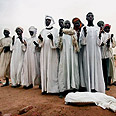
Muslim clerics vs. female genital mutilation
After being introduced to ceremony while traveling in Africa, German human rights activist decides to initiate move to stop custom from spreading. He manages to organize rally of senior Sunni clerics in Egypt, who condemn phenomenon: 'Genital mutilation must be considered criminal aggression against mankind'
"This is a historic change," Rüdiger Nehberg told Ynet after ensuring that leading Sunni clerics condemn the phenomenon of female genital mutilation.
He initiated a conference at the al-Azhar University in Cairo, which ended with a statement issued by 20 clerics: "A Muslim must not hurt a Muslim. Therefore, the genital mutilation must be considered as criminal aggression against mankind."
The rally was sponsored by the most esteemed religious establishment among the Sunnis, and was fully supported by the Egyptian Ministry of Religion.
University President Sheikh Yusuf al-Qardawi, the most popular Sunni scholar and preacher nowadays, also took part in the event.
Every 11 seconds, a woman somewhere in the world undergoes genital mutilation. Thereby, 8,000 women every day fall victim to an ancient custom, which is aimed at "maintaining their morality and ensuring their loyalty," according to Nehberg.
About one-third of the girls who undergo the shocking ceremony pass away due to bleedings or infections which develop afterwards.
The cruel custom is particularly common in Africa and among Muslim societies. Naturally, it is very difficult to know exactly how many women fall victim to such violence, but the United Nations estimates that approximately 60 percent of women in northern Iraq and about 23 percent of the women of Yemen have experienced the horror.
In Africa there is also a common custom in which the entire genitalia is cut off, as opposed to the more common ceremony in which only part of it are cut off.
Nehberg explained, "It takes these girls 30 minutes to urinate, and their period lasts for two weeks."
When they marry, they husbands are forced to "clear their way" in order to have sexual intercourse or "through cruel sexual intercourse or through the use of a knife."
Nehberg, who is not affiliated with any religious group but has positive views on Islam, first encountered the phenomenon when he went on a bicycle ride in Muslim countries.
"In the Danakil desert in Ethiopia I was first introduced to a genital mutilation of a girl. I was shocked. They explained to me that religion requires that women be mutilated, but I knew it was not true."
Since then, he has been fighting firmly to put an end to the custom. Along with his partner he established a small organization called Target. With the seven members of his organization he has already made a lot of progress on the issue, which leaves the UN efforts far behind. He convinced Sultan Ali Mira, leader of the Sunnis in the Danakil desert, that female genital mutilation contradicts the principles of Islam.
"Since that discussion, which was held by the tribe's 60 wise men, there is a duty to report genital mutilation and it has been outlawed," Nehberg explained proudly.
'Opportunity for Islam to portray itself differently'
With the help of the German Foreign Ministry, his efforts succeeded in other places as well: In Djibouti, the sheikhs condemned the custom, and in Mauritania he was asked to distribute the new fatwa among the Bedouins with a procession of camels.
"We, the Germans, walked with 14 camels in the desert, and distributed 70 flags on which the fatwa was written to make them stop mutilating their daughters' genitalia," Nehberg said.
The clerics' ruling has yet to move the Muslim world.
"It will take a long time before such an ancient custom disappears," estimated Professor Muhammad Shamaa of the Islamic Research Academy at al-Azhar University.
In spite of the firm ruling of important clerics such as al-Qardawi, the solution for the problem is still far.
Among the Sunnis there is no central religious establishment which can impose its opinion on the entire public, and therefore the issue remains open to the interpretation of clerics from all factions.
Many conferences have been held on the issue in the past, but the clerics have never managed to reach a united front. Prof. Shamaa provided a disappointing explanation why this time, following Nehberg's intiaitve, it succeeded for the first time.
"We simply did not invite those who disagree with us," he said.
Nehberg was a bit more optimistic: "In the Muslim world there is a huge need to discuss these issues, but there is no culture of discussing sensitive issues.
"When someone from the outside asks questions in an honorable and sensitive manner, positive changes can be made. This is an opportunity for Islam to portray itself in a different way, and not in the way it is represented by fanatic terrorists," he said.










